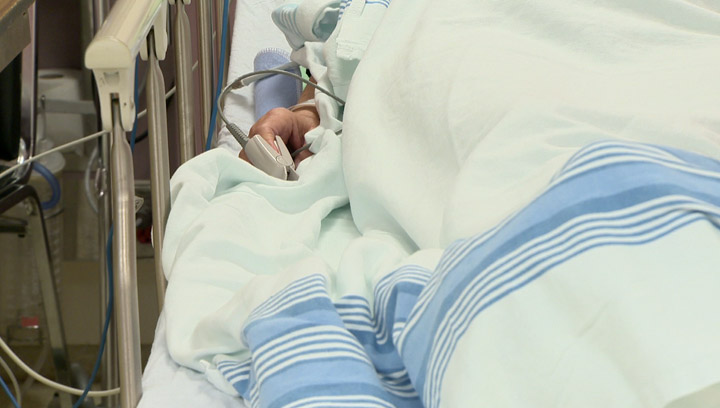TORONTO – As Dr. Joel Cooper remembers it, Tom Hall was an upbeat man, bursting with optimism, even while keeping oxygen tanks at his desk and in his car.

It was 1983. The Toronto man had a fatal lung disease – called idiopathic pulmonary fibrosis. For decades, doctors around the world had tried lung transplants without success – 44 operations were tried, 44 transplants failed. But Hall said he’d be “grateful” for a chance to be the 45th try.
With little time left to live, it was his only hope, after all.
“He understood and was willing to take the risk. And the rest is history as they say,” Cooper told Global News.
Thursday marks the 30th anniversary of the first successful lung transplant in the world. And it’s a made-in-Canada story – Hall’s procedure was performed at Toronto General Hospital.
Watch the hospital’s video honouring the anniversary:
As for Hall, the man who once had fleeting time left to live survived and lived a full life for six years after the transplant. The anniversary is a reminder of how far medicine has come in the span of decades. A successful single lung transplant turned into double lung transplants and the introduction into transplanting other organs.
Cooper, who conducted the surgery 30 years ago at Toronto Gen, is now a thoracic surgeon in the United States. He said he’s still mesmerized when he sees transplant patients thriving.
“To me, it’s still a miracle. Someone who’s on death’s door to look as well as anyone else in the room and conduct a normal live, it’s a miracle,” he said.
The first initial attempt at lung transplant was in 1963 in Mississippi. That patient, a convicted murderer, only survived 18 days. Toronto tried on a patient by 1977. If patients pushed through the operation, they wouldn’t live past two weeks.
That’s when Cooper said he realized there were issues with the healing process.
“We said no more transplants until we go to the lab and with the help of colleagues and people from around the world, we did research for several years, thought we had figured it out and proposed starting again,” Cooper said.
Following Hall’s operation, he was plagued by sickness and bed-ridden. This is how doctors learned that it was crucial for organ transplant patients to get strength training before their surgery.
“The same set of lungs but with exercise, you build up reserves, stamina, and you’re in a better situation to tolerate the operation and recover more quickly,” Cooper said.
He called Hall a “courageous pioneer” for being the man who ended up promising other patients down the line that the transplant could be a success. The mother of the teen who donated the lung to Hall is also a “hero” as far as Cooper’s concerned.
It took a year for doctors to do another lung transplant as they monitored Hall’s progress. Now, they’re commonplace; it’s routine for doctors to do a couple of transplants each week.
Toronto General Hospital did 1,500 transplants since its first. Fellows from around the world came to the hospital to train.
Across Canada, there were 232 lung transplants last year. The one-year survival rate is 85 per cent. Some 30 per cent of patients live at least an extra decade.
Cooper said he still keeps in touch with patients nearly two decades later.
carmen.chai@globalnews.ca
Follow @Carmen_Chai


Comments